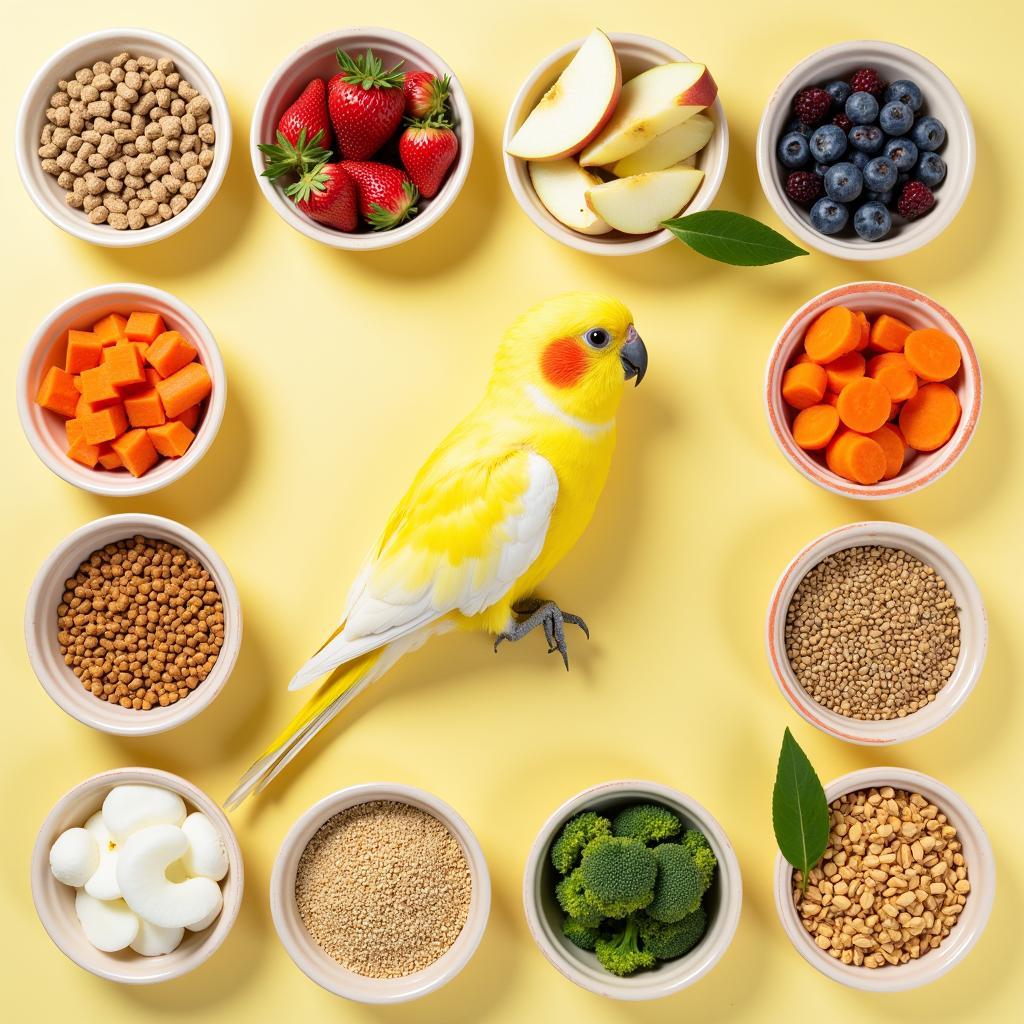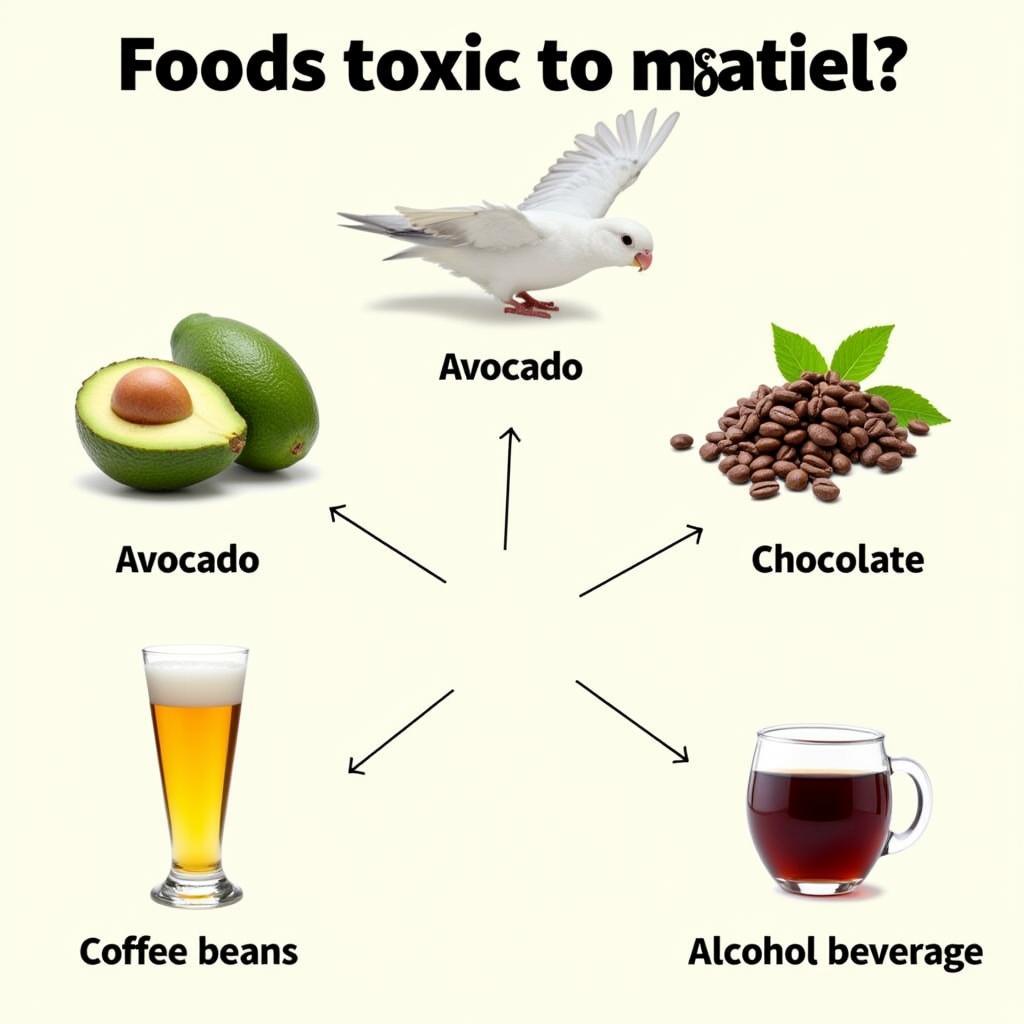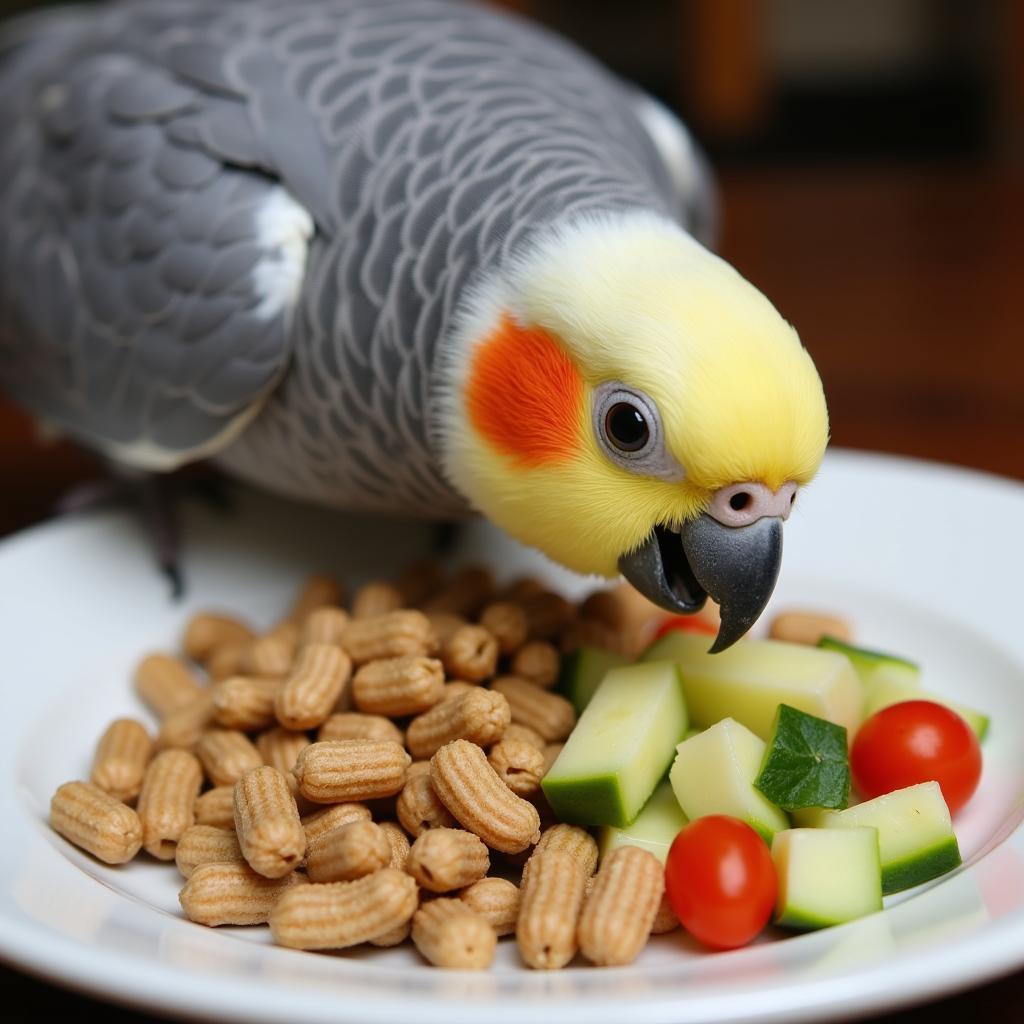Providing a balanced and nutritious diet for your cockatiel is crucial for their health and well-being. While sunflower seeds are a common ingredient in many commercial birdseed mixes, they are high in fat and can contribute to obesity if overfed. This guide explores Cockatiel Food Without Sunflower Seeds, providing options for a healthy and enjoyable diet that keeps your feathered friend thriving.
Why Ditch the Sunflower Seeds?
Sunflower seeds, although loved by many cockatiels, are like the junk food of the bird world. They’re packed with fat and offer limited nutritional value compared to other options. A diet high in sunflower seeds can lead to obesity, fatty liver disease, and other health issues. By reducing or eliminating sunflower seeds, you can create a much healthier eating plan for your cockatiel. This doesn’t mean your bird has to miss out on tasty treats! There are plenty of healthier alternatives to satisfy their cravings.
Building a Balanced Diet without Sunflower Seeds
Creating a sunflower-seed-free diet involves incorporating a variety of healthy foods to ensure your cockatiel receives all the necessary nutrients. A good mix should include high-quality pellets, fresh fruits, vegetables, and healthy grains.
- Pellets: High-quality pellets should form the foundation of your cockatiel’s diet, providing a balanced blend of vitamins, minerals, and other essential nutrients. Look for pellets specifically formulated for cockatiels, ensuring they meet their specific dietary needs.
- Fruits and Vegetables: Fresh fruits and vegetables offer a wide range of vitamins and minerals, adding variety and enriching your cockatiel’s diet. Offer small, bite-sized pieces of safe fruits like apples, bananas, and berries, and vegetables like carrots, broccoli, and leafy greens.
- Healthy Grains: In addition to pellets, offer healthy grains such as quinoa, brown rice, and oats. These provide fiber and other essential nutrients. Avoid processed grains or those with added sugar or salt.
 Healthy Food Options for Cockatiels
Healthy Food Options for Cockatiels
What Fruits and Vegetables Can Cockatiels Eat?
Cockatiels can enjoy a wide variety of fruits and vegetables. Safe options include apples, bananas, berries (strawberries, blueberries, raspberries), melons, oranges, grapes (seedless), carrots, broccoli, spinach, kale, and sweet potatoes. Always wash produce thoroughly and remove any seeds or pits before offering it to your cockatiel.
What Should I Avoid Feeding My Cockatiel?
Certain foods are toxic to cockatiels and should never be given. These include avocado, chocolate, caffeine, alcohol, and foods high in salt, sugar, or fat. Avoid processed foods and anything containing artificial sweeteners or colors.
Dr. Ava Thompson, Avian Veterinarian, explains: “A balanced diet is essential for a cockatiel’s health. Avoiding toxic foods and providing a variety of nutritious options can significantly extend their lifespan and improve their quality of life.”
 Foods to Avoid Giving to Your Cockatiel
Foods to Avoid Giving to Your Cockatiel
How to Transition Your Cockatiel to a New Diet
Switching your cockatiel to a sunflower-seed-free diet should be a gradual process. Start by reducing the amount of sunflower seeds in their current mix while slowly introducing the new foods. Offer small amounts of pellets, fruits, and vegetables alongside the reduced sunflower seed mix. Gradually increase the proportion of the new foods while further decreasing the sunflower seeds until they are eliminated completely. Patience is key, as some cockatiels can be picky eaters.
Making Healthy Food Appealing
If your cockatiel is resistant to trying new foods, try different presentation methods. Hang vegetables from the cage bars, offer fruits in small, colorful skewers, or sprinkle a small amount of finely chopped vegetables on top of their pellets.
Professor Emily Carter, Avian Nutritionist, suggests: “Making healthy food appealing can encourage your cockatiel to try new things. Experiment with different textures and presentations to find what works best for your bird.”
 A Cockatiel Enjoying a Healthy, Sunflower-Seed-Free Meal
A Cockatiel Enjoying a Healthy, Sunflower-Seed-Free Meal
Conclusion
Switching to cockatiel food without sunflower seeds is a crucial step towards ensuring your feathered friend lives a long, healthy, and happy life. By incorporating a balanced mix of pellets, fresh fruits, vegetables, and healthy grains, you can provide your cockatiel with all the necessary nutrients while avoiding the health risks associated with a high-fat diet. Remember to transition your cockatiel gradually and make healthy food appealing to ensure a smooth and successful dietary change.
FAQs
-
What can I give my cockatiel as a treat instead of sunflower seeds? Try small pieces of fruit, vegetables, or healthy grains like cooked quinoa.
-
How long does it take to transition a cockatiel to a new diet? It can take several weeks or even months, depending on your cockatiel’s individual preferences.
-
What are the signs of a healthy cockatiel? Signs include bright eyes, smooth feathers, active behavior, and regular droppings.
-
How often should I feed my cockatiel? Cockatiels should have access to fresh food and water daily.
-
What should I do if my cockatiel refuses to eat the new food? Try different presentation methods, offer the new food alongside their favorite treats, and be patient.
-
Can I give my cockatiel table scraps? No, many human foods are toxic to cockatiels. Stick to a diet of pellets, fruits, vegetables, and healthy grains.
-
Where can I find high-quality cockatiel pellets? Look for pellets specifically formulated for cockatiels at pet stores or online retailers.
For any further assistance regarding your cockatiel’s dietary needs, please contact us at Phone Number: 02437655121, Email: minacones@gmail.com or visit us at 3PGH+8R9, ĐT70A, thôn Trung, Bắc Từ Liêm, Hà Nội, Việt Nam. We have a 24/7 customer support team.